Columbia Southern University - Red Bull Marketing Case Study Analysis
VerifiedAdded on 2022/12/29
|6
|1096
|1
Case Study
AI Summary
This case study examines Red Bull's marketing strategies, focusing on its nontraditional tactics and integrated marketing communications mix. It explores the company's success in the energy drink market, its unique distribution channels, and its strong brand image. The study analyzes Red Bull's sponsorships, advertising, and digital marketing efforts, including comparisons with competitors like Coca-Cola. It also addresses potential risks, such as market saturation and health concerns. The case study recommends that Red Bull sustain its non-traditional marketing approach, while also considering digital marketing strategies to expand its reach and maintain its market leadership. The analysis includes references to relevant literature and provides insights into Red Bull's future steps in marketing and advertising.

Running Head: MANAGEMENT 0
ADVANCE MARKETING -
REDBULL
ADVANCE MARKETING -
REDBULL
Paraphrase This Document
Need a fresh take? Get an instant paraphrase of this document with our AI Paraphraser
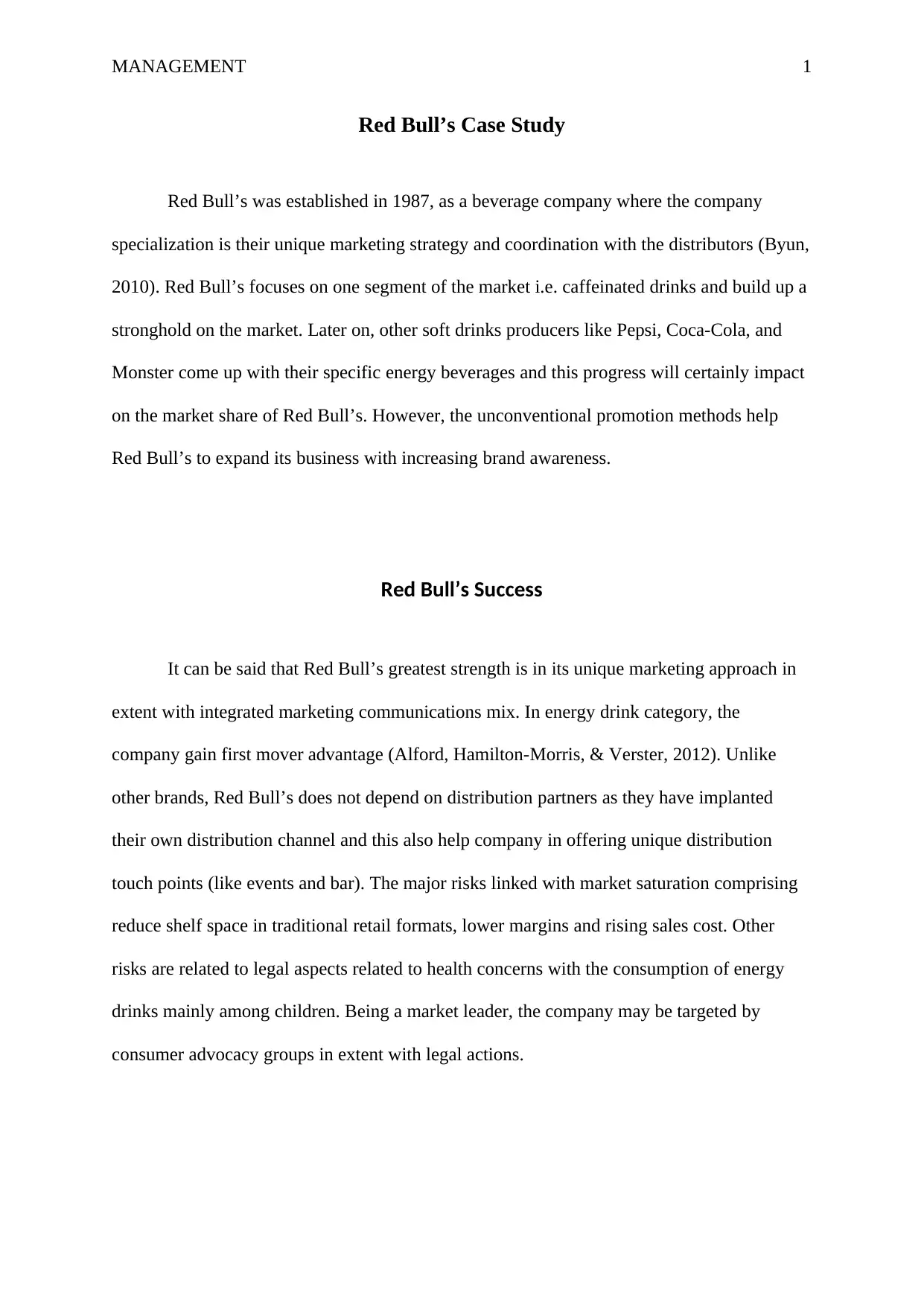
MANAGEMENT 1
Red Bull’s Case Study
Red Bull’s was established in 1987, as a beverage company where the company
specialization is their unique marketing strategy and coordination with the distributors (Byun,
2010). Red Bull’s focuses on one segment of the market i.e. caffeinated drinks and build up a
stronghold on the market. Later on, other soft drinks producers like Pepsi, Coca-Cola, and
Monster come up with their specific energy beverages and this progress will certainly impact
on the market share of Red Bull’s. However, the unconventional promotion methods help
Red Bull’s to expand its business with increasing brand awareness.
Red Bull’s Success
It can be said that Red Bull’s greatest strength is in its unique marketing approach in
extent with integrated marketing communications mix. In energy drink category, the
company gain first mover advantage (Alford, Hamilton-Morris, & Verster, 2012). Unlike
other brands, Red Bull’s does not depend on distribution partners as they have implanted
their own distribution channel and this also help company in offering unique distribution
touch points (like events and bar). The major risks linked with market saturation comprising
reduce shelf space in traditional retail formats, lower margins and rising sales cost. Other
risks are related to legal aspects related to health concerns with the consumption of energy
drinks mainly among children. Being a market leader, the company may be targeted by
consumer advocacy groups in extent with legal actions.
Red Bull’s Case Study
Red Bull’s was established in 1987, as a beverage company where the company
specialization is their unique marketing strategy and coordination with the distributors (Byun,
2010). Red Bull’s focuses on one segment of the market i.e. caffeinated drinks and build up a
stronghold on the market. Later on, other soft drinks producers like Pepsi, Coca-Cola, and
Monster come up with their specific energy beverages and this progress will certainly impact
on the market share of Red Bull’s. However, the unconventional promotion methods help
Red Bull’s to expand its business with increasing brand awareness.
Red Bull’s Success
It can be said that Red Bull’s greatest strength is in its unique marketing approach in
extent with integrated marketing communications mix. In energy drink category, the
company gain first mover advantage (Alford, Hamilton-Morris, & Verster, 2012). Unlike
other brands, Red Bull’s does not depend on distribution partners as they have implanted
their own distribution channel and this also help company in offering unique distribution
touch points (like events and bar). The major risks linked with market saturation comprising
reduce shelf space in traditional retail formats, lower margins and rising sales cost. Other
risks are related to legal aspects related to health concerns with the consumption of energy
drinks mainly among children. Being a market leader, the company may be targeted by
consumer advocacy groups in extent with legal actions.
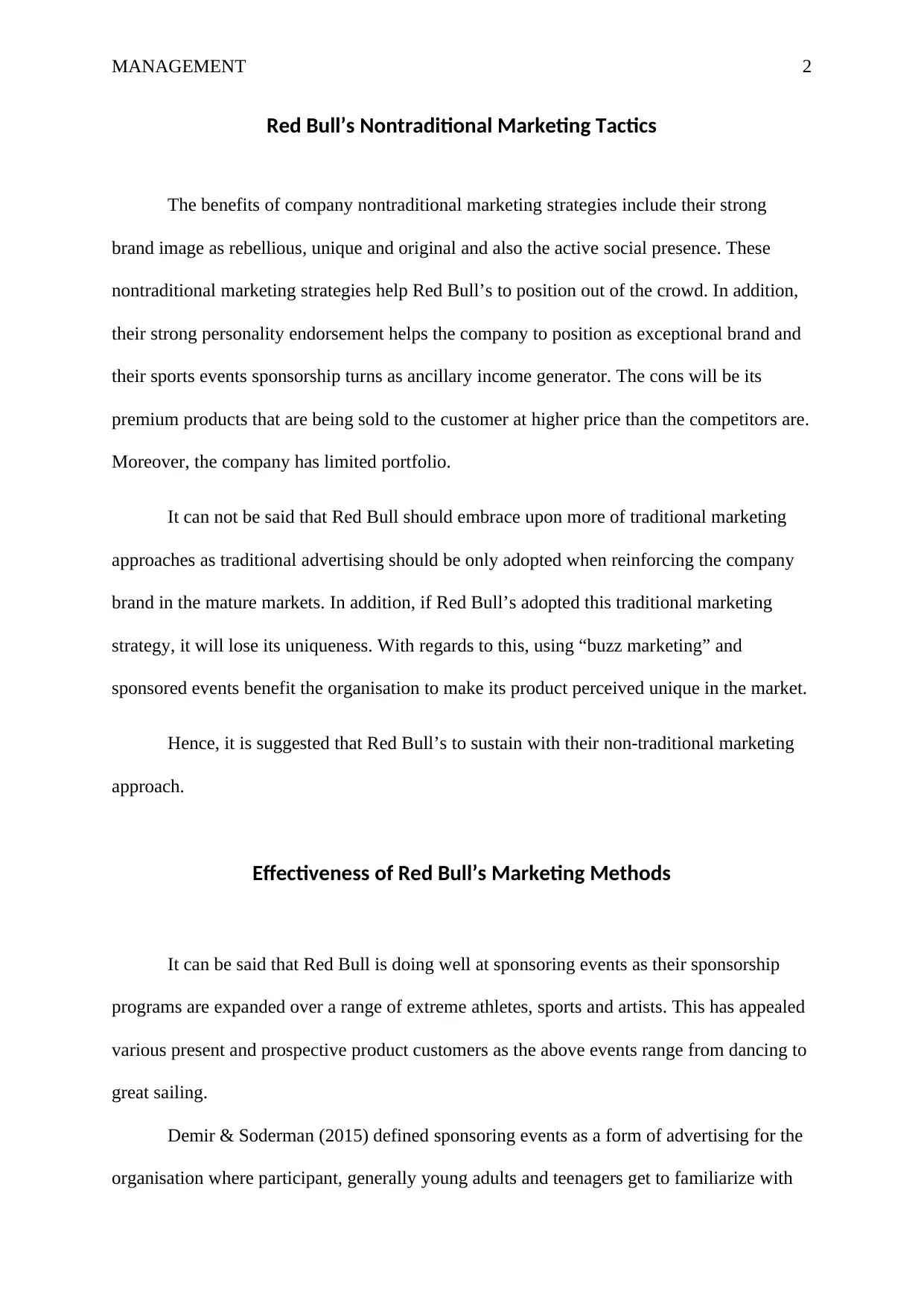
MANAGEMENT 2
Red Bull’s Nontraditional Marketing Tactics
The benefits of company nontraditional marketing strategies include their strong
brand image as rebellious, unique and original and also the active social presence. These
nontraditional marketing strategies help Red Bull’s to position out of the crowd. In addition,
their strong personality endorsement helps the company to position as exceptional brand and
their sports events sponsorship turns as ancillary income generator. The cons will be its
premium products that are being sold to the customer at higher price than the competitors are.
Moreover, the company has limited portfolio.
It can not be said that Red Bull should embrace upon more of traditional marketing
approaches as traditional advertising should be only adopted when reinforcing the company
brand in the mature markets. In addition, if Red Bull’s adopted this traditional marketing
strategy, it will lose its uniqueness. With regards to this, using “buzz marketing” and
sponsored events benefit the organisation to make its product perceived unique in the market.
Hence, it is suggested that Red Bull’s to sustain with their non-traditional marketing
approach.
Effectiveness of Red Bull’s Marketing Methods
It can be said that Red Bull is doing well at sponsoring events as their sponsorship
programs are expanded over a range of extreme athletes, sports and artists. This has appealed
various present and prospective product customers as the above events range from dancing to
great sailing.
Demir & Soderman (2015) defined sponsoring events as a form of advertising for the
organisation where participant, generally young adults and teenagers get to familiarize with
Red Bull’s Nontraditional Marketing Tactics
The benefits of company nontraditional marketing strategies include their strong
brand image as rebellious, unique and original and also the active social presence. These
nontraditional marketing strategies help Red Bull’s to position out of the crowd. In addition,
their strong personality endorsement helps the company to position as exceptional brand and
their sports events sponsorship turns as ancillary income generator. The cons will be its
premium products that are being sold to the customer at higher price than the competitors are.
Moreover, the company has limited portfolio.
It can not be said that Red Bull should embrace upon more of traditional marketing
approaches as traditional advertising should be only adopted when reinforcing the company
brand in the mature markets. In addition, if Red Bull’s adopted this traditional marketing
strategy, it will lose its uniqueness. With regards to this, using “buzz marketing” and
sponsored events benefit the organisation to make its product perceived unique in the market.
Hence, it is suggested that Red Bull’s to sustain with their non-traditional marketing
approach.
Effectiveness of Red Bull’s Marketing Methods
It can be said that Red Bull is doing well at sponsoring events as their sponsorship
programs are expanded over a range of extreme athletes, sports and artists. This has appealed
various present and prospective product customers as the above events range from dancing to
great sailing.
Demir & Soderman (2015) defined sponsoring events as a form of advertising for the
organisation where participant, generally young adults and teenagers get to familiarize with
⊘ This is a preview!⊘
Do you want full access?
Subscribe today to unlock all pages.

Trusted by 1+ million students worldwide
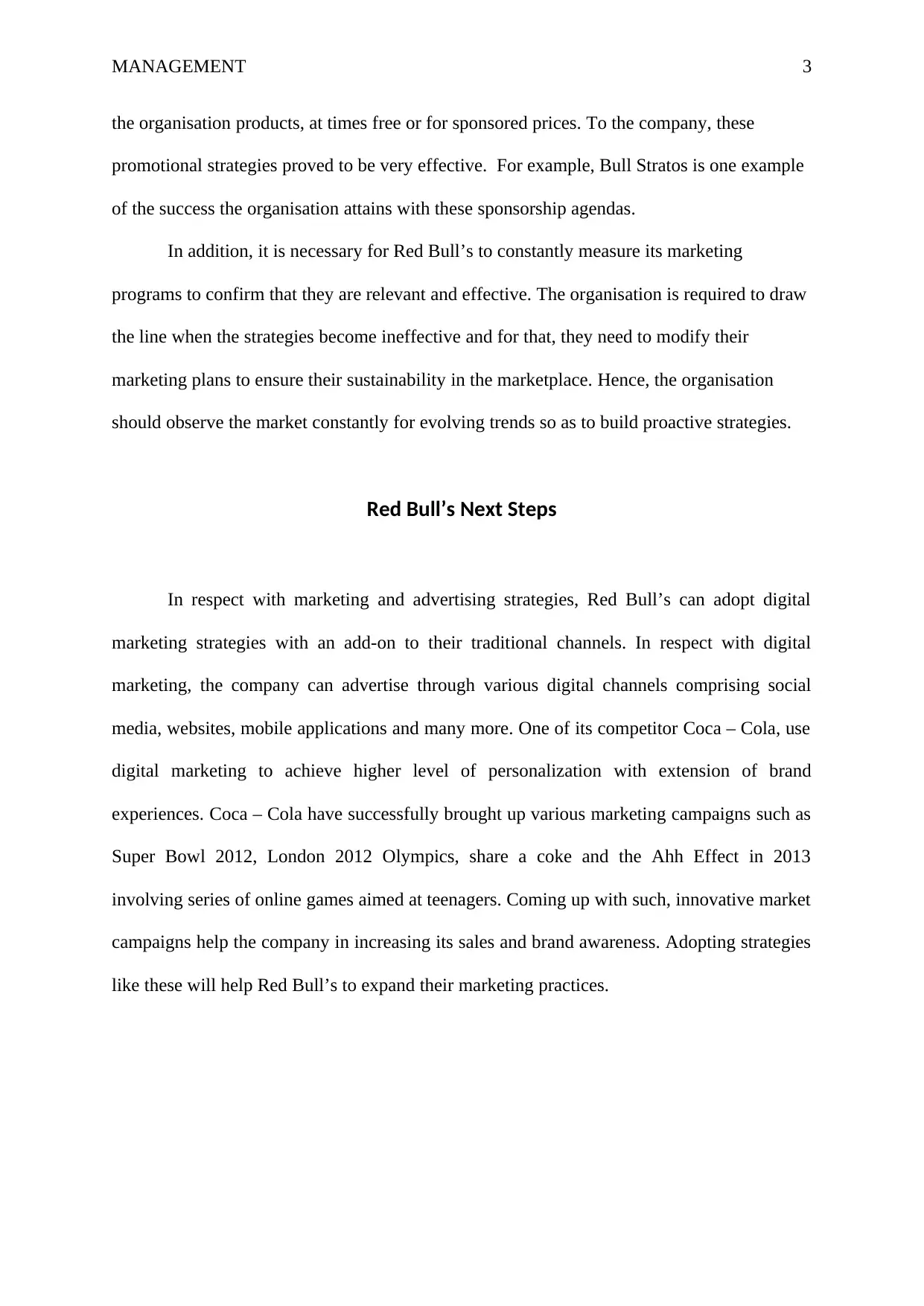
MANAGEMENT 3
the organisation products, at times free or for sponsored prices. To the company, these
promotional strategies proved to be very effective. For example, Bull Stratos is one example
of the success the organisation attains with these sponsorship agendas.
In addition, it is necessary for Red Bull’s to constantly measure its marketing
programs to confirm that they are relevant and effective. The organisation is required to draw
the line when the strategies become ineffective and for that, they need to modify their
marketing plans to ensure their sustainability in the marketplace. Hence, the organisation
should observe the market constantly for evolving trends so as to build proactive strategies.
Red Bull’s Next Steps
In respect with marketing and advertising strategies, Red Bull’s can adopt digital
marketing strategies with an add-on to their traditional channels. In respect with digital
marketing, the company can advertise through various digital channels comprising social
media, websites, mobile applications and many more. One of its competitor Coca – Cola, use
digital marketing to achieve higher level of personalization with extension of brand
experiences. Coca – Cola have successfully brought up various marketing campaigns such as
Super Bowl 2012, London 2012 Olympics, share a coke and the Ahh Effect in 2013
involving series of online games aimed at teenagers. Coming up with such, innovative market
campaigns help the company in increasing its sales and brand awareness. Adopting strategies
like these will help Red Bull’s to expand their marketing practices.
the organisation products, at times free or for sponsored prices. To the company, these
promotional strategies proved to be very effective. For example, Bull Stratos is one example
of the success the organisation attains with these sponsorship agendas.
In addition, it is necessary for Red Bull’s to constantly measure its marketing
programs to confirm that they are relevant and effective. The organisation is required to draw
the line when the strategies become ineffective and for that, they need to modify their
marketing plans to ensure their sustainability in the marketplace. Hence, the organisation
should observe the market constantly for evolving trends so as to build proactive strategies.
Red Bull’s Next Steps
In respect with marketing and advertising strategies, Red Bull’s can adopt digital
marketing strategies with an add-on to their traditional channels. In respect with digital
marketing, the company can advertise through various digital channels comprising social
media, websites, mobile applications and many more. One of its competitor Coca – Cola, use
digital marketing to achieve higher level of personalization with extension of brand
experiences. Coca – Cola have successfully brought up various marketing campaigns such as
Super Bowl 2012, London 2012 Olympics, share a coke and the Ahh Effect in 2013
involving series of online games aimed at teenagers. Coming up with such, innovative market
campaigns help the company in increasing its sales and brand awareness. Adopting strategies
like these will help Red Bull’s to expand their marketing practices.
Paraphrase This Document
Need a fresh take? Get an instant paraphrase of this document with our AI Paraphraser
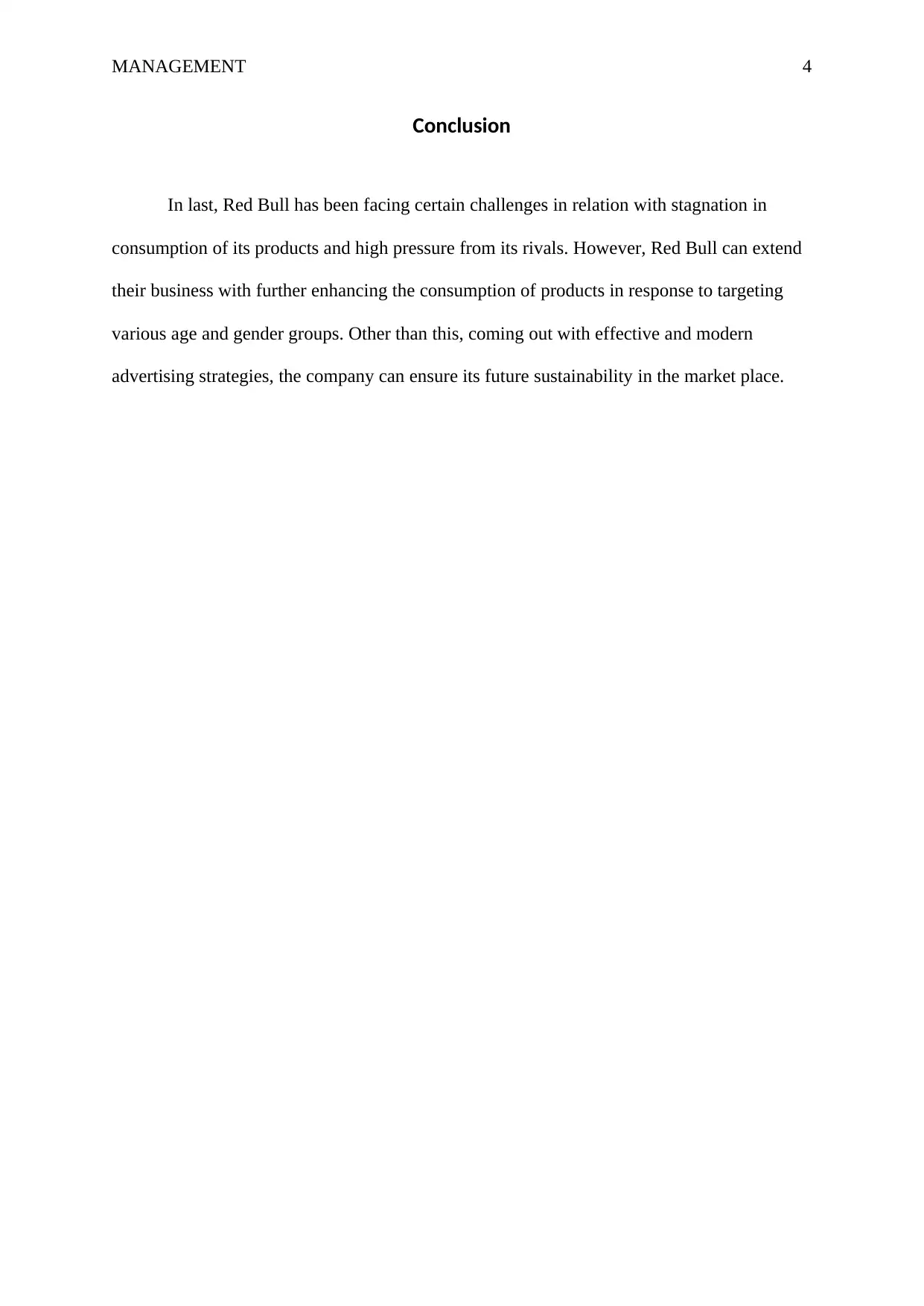
MANAGEMENT 4
Conclusion
In last, Red Bull has been facing certain challenges in relation with stagnation in
consumption of its products and high pressure from its rivals. However, Red Bull can extend
their business with further enhancing the consumption of products in response to targeting
various age and gender groups. Other than this, coming out with effective and modern
advertising strategies, the company can ensure its future sustainability in the market place.
Conclusion
In last, Red Bull has been facing certain challenges in relation with stagnation in
consumption of its products and high pressure from its rivals. However, Red Bull can extend
their business with further enhancing the consumption of products in response to targeting
various age and gender groups. Other than this, coming out with effective and modern
advertising strategies, the company can ensure its future sustainability in the market place.
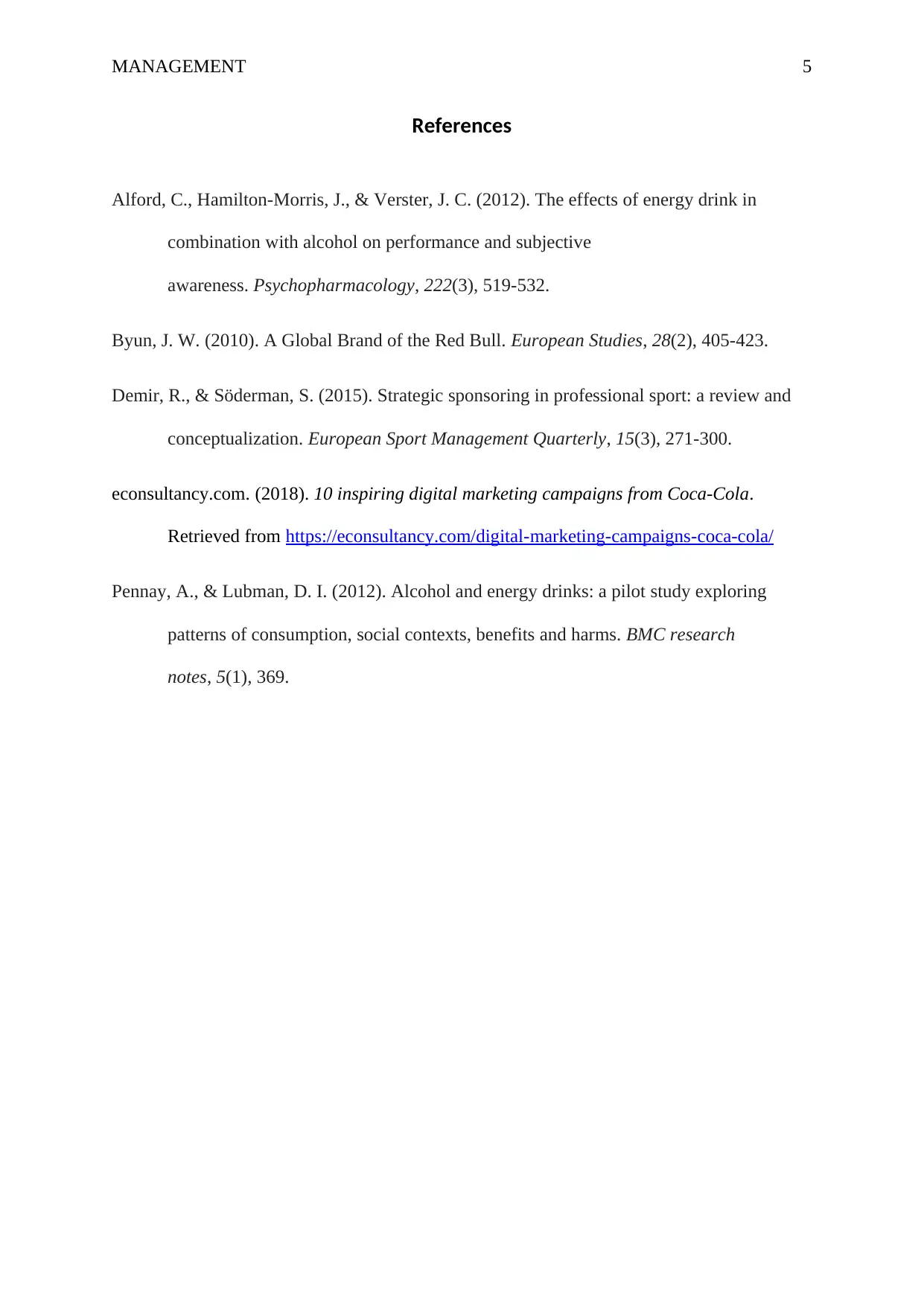
MANAGEMENT 5
References
Alford, C., Hamilton-Morris, J., & Verster, J. C. (2012). The effects of energy drink in
combination with alcohol on performance and subjective
awareness. Psychopharmacology, 222(3), 519-532.
Byun, J. W. (2010). A Global Brand of the Red Bull. European Studies, 28(2), 405-423.
Demir, R., & Söderman, S. (2015). Strategic sponsoring in professional sport: a review and
conceptualization. European Sport Management Quarterly, 15(3), 271-300.
econsultancy.com. (2018). 10 inspiring digital marketing campaigns from Coca-Cola.
Retrieved from https://econsultancy.com/digital-marketing-campaigns-coca-cola/
Pennay, A., & Lubman, D. I. (2012). Alcohol and energy drinks: a pilot study exploring
patterns of consumption, social contexts, benefits and harms. BMC research
notes, 5(1), 369.
References
Alford, C., Hamilton-Morris, J., & Verster, J. C. (2012). The effects of energy drink in
combination with alcohol on performance and subjective
awareness. Psychopharmacology, 222(3), 519-532.
Byun, J. W. (2010). A Global Brand of the Red Bull. European Studies, 28(2), 405-423.
Demir, R., & Söderman, S. (2015). Strategic sponsoring in professional sport: a review and
conceptualization. European Sport Management Quarterly, 15(3), 271-300.
econsultancy.com. (2018). 10 inspiring digital marketing campaigns from Coca-Cola.
Retrieved from https://econsultancy.com/digital-marketing-campaigns-coca-cola/
Pennay, A., & Lubman, D. I. (2012). Alcohol and energy drinks: a pilot study exploring
patterns of consumption, social contexts, benefits and harms. BMC research
notes, 5(1), 369.
⊘ This is a preview!⊘
Do you want full access?
Subscribe today to unlock all pages.

Trusted by 1+ million students worldwide
1 out of 6
Related Documents
Your All-in-One AI-Powered Toolkit for Academic Success.
+13062052269
info@desklib.com
Available 24*7 on WhatsApp / Email
![[object Object]](/_next/static/media/star-bottom.7253800d.svg)
Unlock your academic potential
Copyright © 2020–2026 A2Z Services. All Rights Reserved. Developed and managed by ZUCOL.





